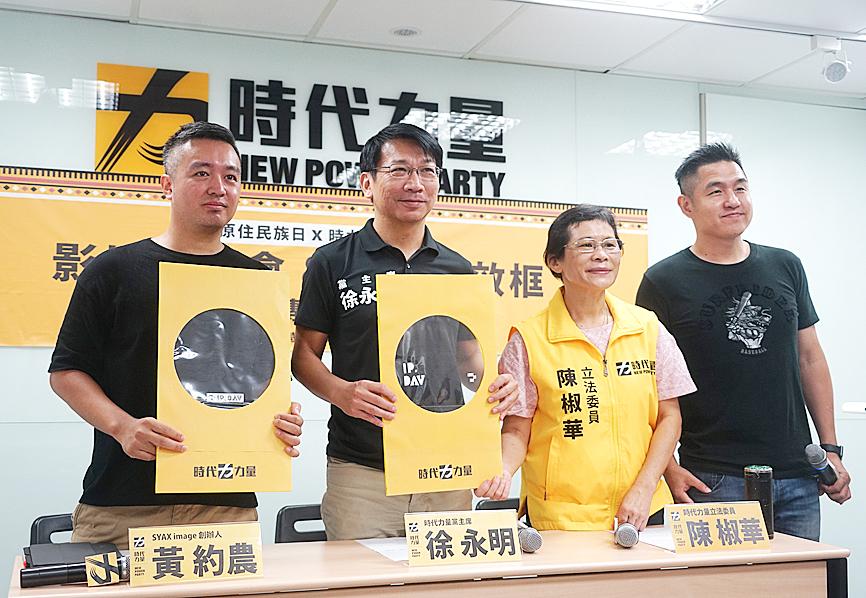The New Power Party (NPP) yesterday said that it would propose a bill to determine seven national holidays to replace those canceled with the implementation of the 40-hour workweek policy and make Aug. 1, Indigenous Peoples’ Day, a national holiday.
The seven canceled national holidays were Jan. 2, Youth Day on March 29, Teachers’ Day on Sept. 28, Taiwan Retrocession Day on Oct. 25, former president Chiang Kai-shek’s (蔣介石) birthday on Oct. 31, Republic of China cofounder Sun Yat-sen’s (孫逸仙) birthday anniversary on Nov. 12 and Constitution Day on Dec. 25.
NPP Chairman Hsu Yung-ming (徐永明) said that the Democratic Progressive Party (DPP) administration has since 2016 failed to keep its promise of reinstating the seven national holidays.

Photo: CNA
“We thought about how we should reinstate the national holidays. We held an online poll to let people decide what these holidays should be. Aside from Indigenous Peoples’ Day on Aug. 1, we propose that July 15 be made a national holiday to commemorate the end of the Martial Law era,” he said.
The NPP has proposed Aug. 1 be made a national holiday, because the National Assembly, which was dissolved in 2005, passed a constitutional amendment on Aug. 1, 1994, to use the phrase “indigenous peoples” to address the nation’s Aborigines in the Constitution, rather than “mountain compatriots,” Hsu said.
The NPP’s other proposed national holidays are: Jan. 2, Freedom of Speech Day on April 7, Earth Day on April 22, Teachers’ Day on Sept. 28, and Human Rights Day and Kaohsiung Incident Memorial Day on Dec. 12, he said.
The government should host commemorative events to observe or celebrate them, he said, adding that the NPP would observe Indigenous Peoples’ Day this year by screening two documentary films in Taipei about the nation’s Aborigines.
Two public discussion sessions would be held afterward: One would be about the government’s promotion of mountain tourism and potential conflict involving traditional Aboriginal territories, and the other is about Aborigines’ right to consultation and consent under the Mining Act (礦業法), Hsu said.
“Earlier this year, the Executive Yuan announced that it lifted all restrictions on access to the nation’s mountains and forests, and even used ‘Salute to Mountains and Forests’ as its slogan for the policy. However, for the Aborigines, this could serve as an asymmetric expansion of government rights. We would continue to focus on issues related to the Mining Act at the Legislative Yuan,” he said.
Dumas Temu (黃約農), an Atayal, is the director of one of the documentary films to be shown on Friday.
He said that many of the mountains in the nation are Aborigines’ traditional territories.
Yushan (玉山), for example, is home to Tsou and Bunun communities, he said.
There are bout 370 million indigenous people worldwide and about 540,000 of them live in Taiwan, Temu said, adding that they have been deprived of their rights by foreign political regimes and capitalists.
The NPP said it would use a logo featuring Indigenous Peoples’ Day on its Facebook page until Saturday to raise awareness about the issues concerning the nation’s Aborigines.
This shows that the party stands with indigenous cultures around the world to fight for their rights and defend their cultures, Temu said.

Taiwan’s Liu Ming-i, right, who also goes by the name Ray Liu, poses with a Chinese Taipei flag after winning the gold medal in the men’s physique 170cm competition at the International Fitness and Bodybuilding Federation Asian Championship in Ajman, United Arab Emirates, yesterday.

Costa Rica sent a group of intelligence officials to Taiwan for a short-term training program, the first time the Central American country has done so since the countries ended official diplomatic relations in 2007, a Costa Rican media outlet reported last week. Five officials from the Costa Rican Directorate of Intelligence and Security last month spent 23 days in Taipei undergoing a series of training sessions focused on national security, La Nacion reported on Friday, quoting unnamed sources. The Costa Rican government has not confirmed the report. The Chinese embassy in Costa Rica protested the news, saying in a statement issued the same

A year-long renovation of Taipei’s Bangka Park (艋舺公園) began yesterday, as city workers fenced off the site and cleared out belongings left by homeless residents who had been living there. Despite protests from displaced residents, a city official defended the government’s relocation efforts, saying transitional housing has been offered. The renovation of the park in Taipei’s Wanhua District (萬華), near Longshan Temple (龍山寺), began at 9am yesterday, as about 20 homeless people packed their belongings and left after being asked to move by city personnel. Among them was a 90-year-old woman surnamed Wang (王), who last week said that she had no plans

TO BE APPEALED: The environment ministry said coal reduction goals had to be reached within two months, which was against the principle of legitimate expectation The Taipei High Administrative Court on Thursday ruled in favor of the Taichung Environmental Protection Bureau in its administrative litigation against the Ministry of Environment for the rescission of a NT$18 million fine (US$609,570) imposed by the bureau on the Taichung Power Plant in 2019 for alleged excess coal power generation. The bureau in November 2019 revised what it said was a “slip of the pen” in the text of the operating permit granted to the plant — which is run by Taiwan Power Co (Taipower) — in October 2017. The permit originally read: “reduce coal use by 40 percent from Jan.